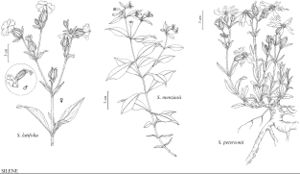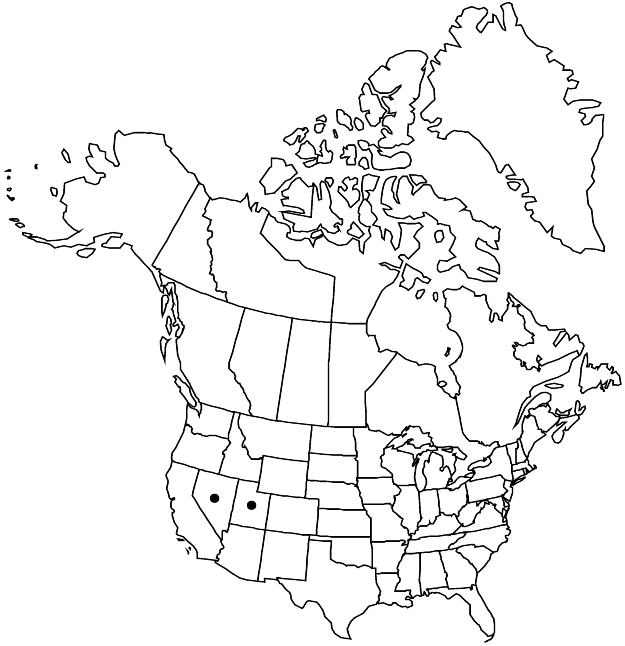Difference between revisions of "Silene petersonii"
Madroño 6: 24. 1941.
FNA>Volume Importer |
imported>Volume Importer |
||
| (One intermediate revision by one other user not shown) | |||
| Line 8: | Line 8: | ||
}} | }} | ||
|common_names=Peterson’s campion or catchfly | |common_names=Peterson’s campion or catchfly | ||
| + | |special_status={{Treatment/ID/Special_status | ||
| + | |code=F | ||
| + | |label=Illustrated | ||
| + | }}{{Treatment/ID/Special_status | ||
| + | |code=E | ||
| + | |label=Endemic | ||
| + | }}{{Treatment/ID/Special_status | ||
| + | |code=C | ||
| + | |label=Conservation concern | ||
| + | }} | ||
|basionyms= | |basionyms= | ||
|synonyms={{Treatment/ID/Synonym | |synonyms={{Treatment/ID/Synonym | ||
| Line 55: | Line 65: | ||
|publication title=Madroño | |publication title=Madroño | ||
|publication year=1941 | |publication year=1941 | ||
| − | |special status= | + | |special status=Illustrated;Endemic;Conservation concern |
| − | |source xml=https:// | + | |source xml=https://bitbucket.org/aafc-mbb/fna-data-curation/src/2e0870ddd59836b60bcf96646a41e87ea5a5943a/coarse_grained_fna_xml/V5/V5_404.xml |
|subfamily=Caryophyllaceae subfam. Caryophylloideae | |subfamily=Caryophyllaceae subfam. Caryophylloideae | ||
|genus=Silene | |genus=Silene | ||
Latest revision as of 22:10, 5 November 2020
Plants perennial, rhizomatous; caudex thick, with many rhizomatous, creeping, branched, slender subterranean shoots, terminating in tight tufts of leaves and erect flowering stems. Stems simple, 5–15 cm, pubescent and viscid, with stipitate glands. Leaves: basal with blade 1-veined, oblanceolate, broadly spatulate, 1–4 cm × 2–8 mm, apex obtuse to acute, glandular-puberulent throughout, rarely subglabrous adaxially; cauline in 3–6 pairs, sessile, reduced distally, blade lanceolate, narrowly elliptic, or oblanceolate, 2–4 cm × 2–8 mm, apex ± acute, glandular-puberulent throughout. Inflorescences usually with solitary terminal flower, sometimes cymose, to 8-flowered, open. Pedicels erect or angled near tip with flowers slightly nodding, 1–3 times longer than calyx, glandular-puberulent, often densely so. Flowers: calyx prominently 10-veined, campanulate, not contracted proximally around carpophore, 15–20 × 4–8 mm, papery, margins dentate, veins parallel, usually purple tinged, with pale commissures; lobes ovate, 3–5 mm, glandular-puberulent, midrib triangular, margins purple tinged, broad, membranous, apex obtuse; corolla bright pink, clawed, claw equaling calyx, broad and ligulate but abruptly contracted into limb, limb broadly cuneate, shallowly to deeply 2–4-lobed, 5–15 mm, lobes broad or narrow, appendages absent or to 2 mm, margins erose; stamens slightly longer than corolla claw; stigmas 3(–5), slightly longer than corolla claw. Capsules equaling calyx, opening by 6 (or 8 or 10) lanceolate teeth; carpophore 1–2.5 mm. Seeds brown, broadly reniform, flattened, 2–2.5 mm, rugose, more coarsely so on margins. 2n = 96.
Phenology: Flowering summer.
Habitat: Calcareous gravel, clay, talus, and rocks on ridges, slopes, and barren ground
Elevation: 2000-3400 m
Discussion
Of conservation concern.
This beautiful alpine species is variable with respect to density of pubescence, flower size, and petal structure. As this variation occurs both within and among populations, little useful purpose is served by giving names to it. The Nevada population, which is the basis for the name Silene clokeyi, is interfertile (A. R. Kruckeberg 1961) with populations in Utah (the basis for the name S. petersonii). Accordingly, a single species is recognized here without infraspecific taxa.
Selected References
None.

